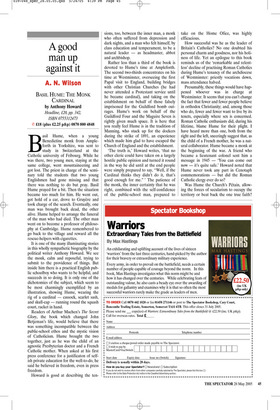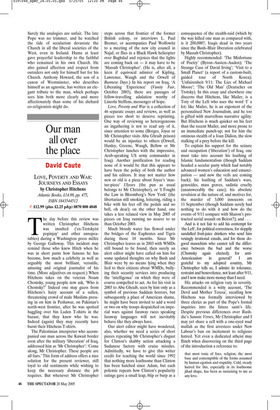A good man up against it
A. N. Wilson
BASIL HUME: THE MONK CARDINAL by Anthony Howard Headline, £20, pp. 342, ISBN 0755312473 ✆ £18 (plus £2.25 p&p) 0870 800 4848 Basil Hume, when a young Benedictine monk from Ampleforth in Yorkshire, was sent to study in Switzerland at the Catholic university of Fribourg. While he was there, two young men, staying at the same college, went mountaineering and got lost. The priest in charge of the seminary told the students that two young Englishmen had gone missing and that there was nothing to do but pray. Basil Hume prayed for a bit. Then the situation became too much for him. He went out, got hold of a car, drove to Gruyère and took charge of the search. Eventually, one man was brought back dead, the other alive. Hume helped to arrange the funeral of the man who had died. The other man went on to become a professor of philosophy at Cambridge. Hume remembered to go back to the village and reward all the rescue-helpers with cigarettes.
It is one of the many illuminating stories in this wholly sympathetic biography by the political writer Anthony Howard. We see the monk, calm and reposeful, trying to submit to the providence of things. But inside him there is a practical English public schoolboy who wants to be helpful, and succeeds in so doing. It is only one of the dichotomies of the subject, which seem to be most charmingly exemplified by an illustration, showing Hume, wearing the rig of a cardinal — cassock, scarlet sash, and skull-cap — running round the squash court, racket in hand.
Readers of Arthur Machen’s The Secret Glory, the book which changed John Betjeman’s life, would believe that there was something incompatible between the public-school ethos and the mystic vision of Catholicism. Hume brought the two together, just as he was the child of an agnostic Presbyterian doctor and a French Catholic mother. When asked at his first press conference for a justificaton of selfish private education for the well-to-do, he said he believed in freedom, even in press freedom.
Howard is good at describing the ten sions, too, between the inner man, a monk who often suffered from depression and dark nights, and a man who felt himself, by class education and temperament, to be a natural leader — as headmaster, abbot and archbishop.
Rather less than a third of the book is devoted to Hume’s time at Ampleforth. The second two-thirds concentrates on his time at Westminster, overseeing the first Papal visit to England, building bridges with other Christian Churches (he had never attended a Protestant service until he became cardinal), and taking on the establishment on behalf of those falsely imprisoned for the Guildford bomb outrages. Hume’s work on behalf of the Guildford Four and the Maguire Seven is rightly given much space. It is here that you really feel Hume is in the tradition of Manning, who stuck up for the dockers during the strike of 1891, an experience which made him glad to have escaped the Church of England and the establishment.
‘The truth is,’ Howard writes, ‘that no other cleric could have taken on a largely hostile public opinion and turned it round in the way he did until at the end people were simply prepared to say, “Well, if the Cardinal thinks they didn’t do it, that’s good enough for me.” ’ The patience of the monk, the inner certainty that he was right, combined with the self-confidence of the public-school man, prepared to take on the Home Ofice, was highly efficacious.
How successful was he as the leader of Britain’s Catholics? No one doubted his personal charm and goodness, nor his holiness of life. Yet an epilogue to this book reminds us of the ‘remarkable and relentless’ decline of practising Roman Catholics during Hume’s tenancy of the archdiocese of Westminster: priestly vocations down, mass attendance halved.
Presumably, these things would have happened whoever was in charge at Westminster. It seems that you can’t change the fact that fewer and fewer people believe in orthodox Christianity; and, among those who do, fewer and fewer want to live by its tenets, especially where sex is concerned. Roman Catholic enthusiasts did, during his lifetime, blame Hume for their plight. I have heard more than one, both from the right and the left, sneeringly suggest that, as the child of a French mother, he was a natural collaborator. Hume became a monk at the beginning of the war. A friend who became a lieutenant colonel sent him a message in 1945 — ‘You can come out now — it’s quite safe.’ Howard noted that Hume never took any part in Cenotaph commemorations — but did the Roman Catholic clergy ever do so?
Was Hume the Church’s Pétain, allowing the forces of secularism to occupy the territory or beat back the one true faith? Surely the analogies are unfair. The late Pope was no trimmer, and he watched the tide of secularism devastate the Church in all the liberal societies of the West, even in Ireland. Hume at least gave prayerful leadership to the faithful who remained in his own Church. He also gained affection and respect from outsiders not only for himself but for his Church. Anthony Howard, the son of a canon of Westminster, who describes himself as an agnostic, has written an elegant tribute to the man, which perhaps sees him both more clearly and more affectionately than some of his diehard co-religionists might do.























































 Previous page
Previous page